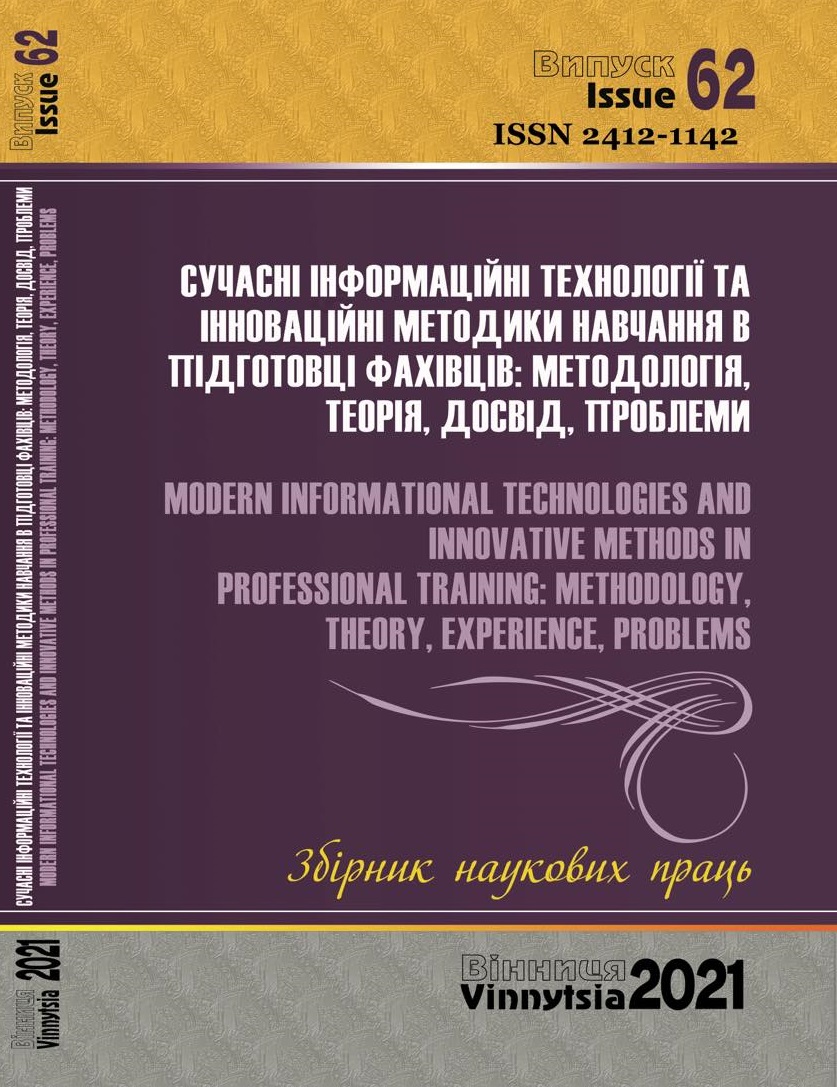THE DIDACTIC MODEL OF FORMATION OF PROFESSIONAL COMPETENCE OF FUTURE EDUCATORS OF PRESCHOOL ESTABLISHMENT BY MEANS OF COMPUTER TECHNOLOGIES
DOI:
https://doi.org/10.31652/2412-1142-2021-62-206-214Keywords:
професійна компетентність, етапи, комп’ютерні технології, майбутні вихователі, дидактична модель, діти дошкільного вікуAbstract
The article has presented a didactic model of formation of professional competence of future
educators of preschool educational establishment by means of computer technologies. The model consists
of three stages: cognitive-enriching, productive-activity, creative-informational. The purpose of the first
stage was to clarify the knowledge of students about the functions and work with the computer in their own
and educational activities and to acquaint them with the methods of using the computer in future
professional activities. The purpose of the second productive-activity stage was to equip future educators with skills and abilities of independent work with computer programs of professional orientation. The
purpose of the third - creative-informational stage was the maximum immersion of students in active
independent creative computer-informational activity both in the conditions of the educational
establishment and in the pedagogical practice at this educational establishment. Each of the modules
contains examples of fragments of lessons with students, a portfolio of professional techniques and a
portfolio on "The usage of computer technologies at preschool educational establishment", fragments of
educational computer games for older preschool children with the Internet and their analysis, etc. The author
has presented stages of the didactic models for the formation of professional competence of future educators
of preschool children by means of computer technologies include the implementation of pedagogical
requirements. At the cognitive-enriching stage, the first pedagogical condition has been realized -
informatization of teaching professional disciplines in the process of professional training of future
educators of preschool children by means of computer technologies. At the productive and activity stage,
the pedagogical condition has been realized - the presence of an appropriate information environment at
the faculties of preschool educational establishment. At the third, creative and informational stage, a
pedagogical condition has been realized such as individualization and intensification of the usage of
computer technologies in the educational process of higher educational establishment. It was concluded
that the materials of the special course "Methods of teaching preschool children computer literacy" aimed
at awareness students of various opportunities to use computer technologies in the pedagogical process of
modern schools, effectively influenced the training of students.
Downloads
References
x1. Кабінет Міністрів України. (2011, листоп. 23). Постанова No 1392, Базовий компонент дошкільної освіти
України. Електронний ресурс.. Режим доступу: http://zakon4.rada.gov.ua/laws/show/v_5-2736-12.
В. П. Беспалько, Образование и обучение с использованием компьютеров (педагогика третьего
тысячелетия) Текст.. Москва, Россия: МПСИ, 2002.
Г. В. Бєлєнька, Формування професійної компетентності сучасного вихователя дошкільного навчального
закладу. Київ, Україна: Київ. ун-т ім. Б. Грінченка, 2011.
А. М. Богуш, та Н. В. Лисенко, Українське народознавство в дошкільному закладі. Київ, Україна: Вища
школа, 1994.
Б. С. Гершунский, Компьютеризация в сфере образования: проблемы и перспективы. Москва, Россия:
Педагогика, 1987.
А. А. Давиденко, "Можливості ЕОМ щодо творчості" у Наукові записки Кіровоградського державного
педагогічного університету імені Володимира Винниченка. Педагогічні науки, вип. 51, ч. 1, с. 219.
Кіровоград, Україна: КДПУ ім. В. Винниченка, 2003,
А. А. Дзюбенко, Новые информационные технологии в образовании. Москва, Россия, 2000.
Р. М. Гбдрахманова, и С. А. Ширшова, Использование компьютерных презентаций в коррекционно-
логопедической работе ДОУ. Самара, Россия, 2009.
С. Ляшенко, та З. Зінченко, "Інтеграція інформаційно-комунікаційних технологій у освітній процес",
Вихователь-методист дошкільного закладу, No 7, с. 16-30, 2013.
А. Панченко, "Модернізація освітнього процесу у ДНЗ в умовах інформатизації освіти, Вихователь-
методист дошкільного закладу, No 1, с. 7-11, 2012.
Е. Л. Смирнова-Трибульская, Основы формирования информатических компетентностей учителей в
области дистанционного обучения. Херсон, Україна: Айлант, 2007.
О. К. Филатов, Информатизация современных информационных технологий обучения в высшей школе.
Ростов на Дону, Россия: Мираж, 1997.
Е. И. Машбиц, Психолого-педагогические проблемы компьютеризации обучения. Москва, Россия:
Педагогика, 1988.
А. П. Єршов, "Компьютеризация школы и математическое образование", Математика в школе, No 1,
с. 14-31, 1989.
Л. Буркова, "Технології в освіті", Рідна школа, No 2, с. 18-19, 2001.
М. І. Жалдак, В. В. Лапінський, та М. І. Шут, Комп’ютерно-орієнтовані засоби навчання математики,
фізики, інформатики. Київ, Україна: НПУ імені М. П. Драгоманова, 2004.
Downloads
Published
Issue
Section
License
Copyright (c) 2021 Оксана Чекан, Марина Гедеон (Кравченко)

This work is licensed under a Creative Commons Attribution 4.0 International License.





